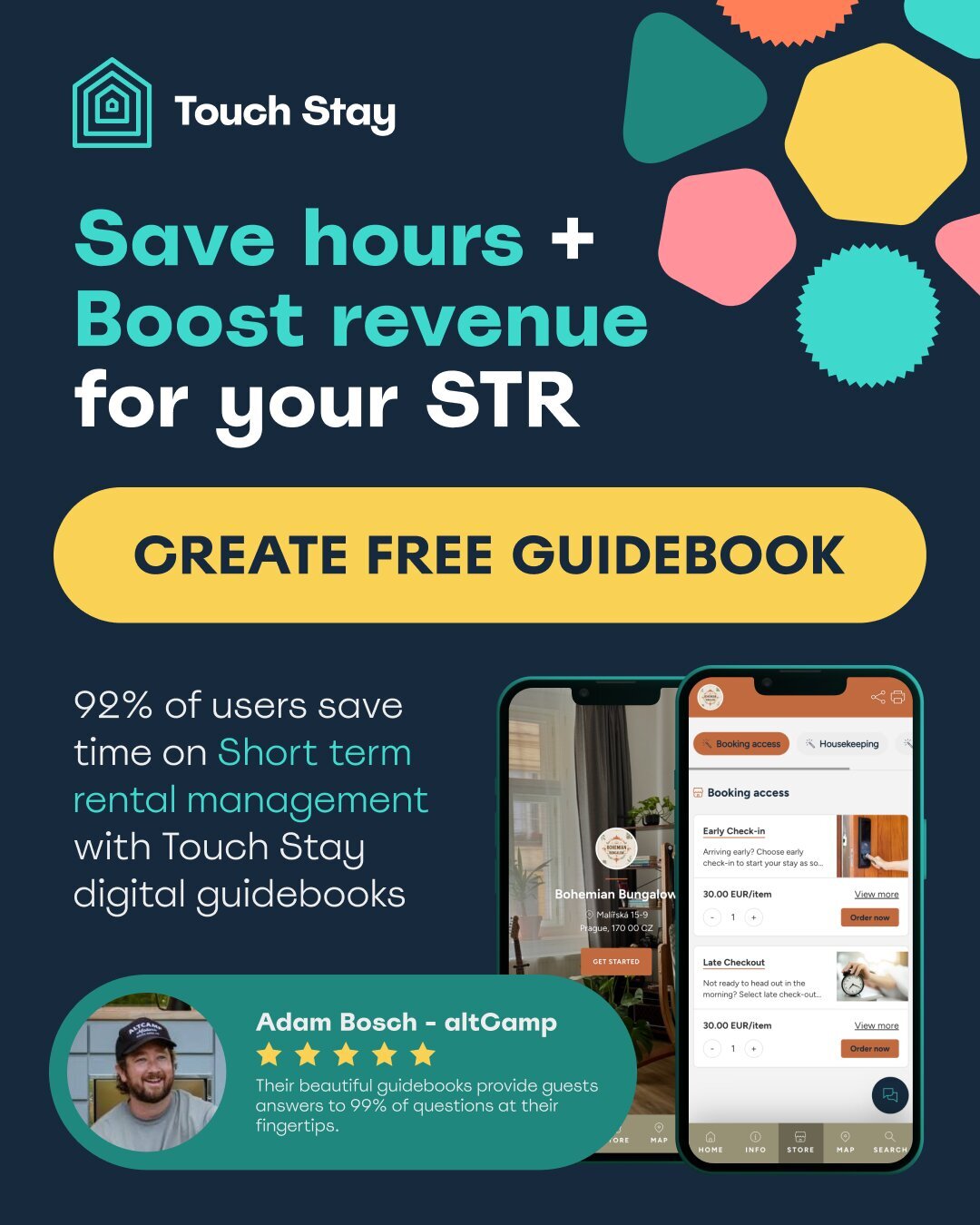Are you a property manager struggling to balance personal time with guest bookings? Or perhaps an event planner trying to navigate the complexities of peak season availability? Understanding blackout dates is crucial for anyone in the hospitality industry looking to optimise their booking strategy and maximise revenue.
In this comprehensive guide, we'll explore everything you need to know about blackout dates, from basic definitions to advanced management strategies. Whether you're a vacation rental host, travel industry professional, or event planner, you'll learn how to effectively use blackout dates to your advantage:
- What are blackout dates?
- Most common blackout dates
- Why are blackout dates useful for hosts?
- Types of blackout dates across different industries
- How blackout dates affect pricing and revenue management
- Managing blackout dates as a vacation rental host
- Common blackout challenges and solutions
- Tips for travellers: how to navigate blackout dates
- How blackout dates vary by region and season
- Future trends in blackout date management
- FAQs about blackout dates
What are blackout dates?
Blackout dates are specific calendar dates when bookings are restricted or unavailable. Think of them as your property's "do not disturb" signs – they're predetermined periods when normal booking rules don't apply, typically during high-demand seasons or when the property is reserved for personal use.
Most common blackout dates
- Major holidays
- Christmas (December 24-26)
- New Year's Eve and Day (December 31-January 1)
- Thanksgiving weekend (US)
- Easter weekend
- Peak season periods
- School holiday periods
- Summer vacation (July-August)
- Spring break (March-April)
- Special events
- Local festivals and conferences
- Major sporting events
- Cultural celebrations
- Maintenance periods
- Annual property updates
- Seasonal changeovers
- Deep cleaning schedules
Why are blackout dates useful for hosts?
Blackout dates serve multiple purposes for property managers and hosts:
Personal use management
- Reserve time for family holidays
- Schedule property maintenance
- Host private events
Revenue optimisation
- Implement minimum stay requirements during peak periods
- Adjust pricing strategies for high-demand dates
- Control inventory during premium booking windows
Operational efficiency
- Prevent overbooking during staff holidays
- Schedule deep cleaning and maintenance
- Manage turnover periods effectively
Event management
- Block dates for special occasions
- Accommodate group bookings
- Reserve time for property photoshoots
Types of blackout dates across different industries
Different sectors utilise blackout dates in unique ways to manage demand and optimise operations. Let's dive deep into how each industry approaches blackout dates and what we can learn from their strategies.
Hotels and resorts
Hotels typically implement blackout dates during:
- Peak tourist seasons
- Major conventions and conferences
- Local sporting events
- Holiday periods
Their approach often includes:
- Sophisticated yield management systems
- Tiered pricing structures
- Package deals for non-blackout periods
- Special arrangements for corporate clients
Example: a beach resort might implement blackout dates during the entire summer season, while a ski resort would focus on winter months and holiday weekends.
Vacation rentals
The vacation rental industry has unique challenges when it comes to blackout dates:
- More flexible booking patterns
- Individual owner preferences
- Local market conditions
- Seasonal demand fluctuations
Successful vacation rental managers often:
- Create seasonal blackout strategies
- Coordinate with local event organisers
- Develop owner-specific blackout policies
- Implement dynamic minimum stay requirements
Example: a vacation rental owner in a town with a popular music festival might have blackout dates during the festival weekend.
Airlines
Airlines have perhaps the most complex blackout date systems, affecting:
- Reward mile redemptions
- Promotional fares
- Corporate travel agreements
- Student and senior discounts
Typical airline blackout policies include:
- Holiday travel restrictions
- Peak business travel periods
- Special event limitations
- Seasonal route adjustments
Example: Airlines might have blackout dates during busy business travel weeks, especially for popular business destinations.
Event venues
Event spaces handle blackout dates differently:
- Annual recurring events
- Maintenance periods
- High-demand seasons
- Setup and teardown times
Example: a convention centre might have blackout dates for annual events like Comic-Con or a trade show.
Holiday blackout dates
Holiday periods represent the most common type of blackout dates across all industries. During these times, properties often implement:
- Minimum stay requirements
- Premium pricing
- Special package deals
- Modified cancellation policies
Event-driven blackout dates
Major events can create significant demand spikes, requiring careful management of availability:
- Music festivals and concerts
- Sporting events
- Conferences and conventions
- Local cultural celebrations
How blackout dates affect pricing and revenue management
Blackout dates significantly impact pricing strategies:
Dynamic pricing opportunities
- Implement surge pricing during high-demand periods
- Adjust minimum stay requirements
- Create special packages and bundles
Revenue optimisation
- Higher rates during peak seasons
- Premium pricing for special events
- Enhanced amenities and services
Advanced pricing strategies during blackout periods
Smart property managers use various techniques to maximise revenue during blackout periods:
- Graduated pricing structure
- Early booking discounts
- Last-minute premium rates
- Length-of-stay incentives
- Package deal pricing
- Competitive analysis
- Monitor local event calendars
- Track competitor pricing
- Analyse historical booking patterns
- Adjust rates based on demand
- Value-added services
- Special amenities during peak periods
- Premium concierge services
- Exclusive access to local events
- Enhanced guest experiences
Managing blackout dates as a vacation rental host
Technology solutions
Modern property management systems offer sophisticated tools for managing blackout dates:
- Calendar synchronisation
- Real-time updates across platforms
- Automated booking rules
- Multi-channel distribution
- Instant availability updates
- Communication systems
- Automated guest notifications
- Owner calendar blocking
- Team schedule coordination
- Maintenance period planning
- Reporting and analytics
- Occupancy rate tracking
- Revenue optimisation
- Seasonal trend analysis
- Booking pattern insights
Strategic planning
Successful hosts develop comprehensive blackout date strategies:
- Annual planning
- Review historical data
- Identify peak periods
- Schedule maintenance
- Plan personal use
- Market analysis
- Study local events
- Monitor competitor strategies
- Track booking trends
- Analyse guest feedback
- Policy development
- Create clear guidelines
- Establish booking rules
- Define exception processes
- Document procedures
Revenue optimisation strategies for blackout periods
- Implement graduated pricing approaches
- Create special packages
- Offer early booking incentives
- Develop loyalty programs
Common blackout challenges and solutions
Challenge 1: overbooking during peak periods
Solutions:
- Implement robust calendar management systems
- Use channel managers to synchronise bookings
- Maintain buffer days between stays
- Create clear communication protocols
Challenge 2: revenue loss during off-peak times
Solutions:
- Develop shoulder season promotions
- Create special packages
- Target different market segments
- Implement flexible pricing strategies
Challenge 3: managing guest expectations
Solutions:
- Communicate blackout dates clearly
- Provide alternative booking options
- Offer incentives for non-peak periods
- Maintain transparent pricing policies
Tips for travellers: how to navigate blackout dates
How blackout dates vary by region and season
Coastal destinations
- Summer peak seasons
- Holiday weekend restrictions
- Shoulder season flexibility
- Winter maintenance periods
Example: a popular beach house rental might have blackout dates during spring break and summer holidays.
Urban properties
- Business travel patterns
- Convention centre schedules
- Cultural event calendars
- Holiday celebrations
Example: a hotel in a major city might have blackout dates during a major conference or trade show.
Mountain destinations
- Winter sports seasons
- Summer hiking periods
- Shoulder season maintenance
- Festival accommodations
Example: a ski chalet might have blackout dates during peak ski season, such as Christmas and New Year's.
International considerations
- Local holiday calendars
- Cultural celebrations
- Religious observances
- Regional travel patterns
Example: a villa in the Mediterranean might have blackout dates during the peak summer tourist season in Europe.
Future trends in blackout date management
Technology integration
- AI-powered pricing optimisation
- Automated calendar management
- Predictive analytics
- Smart booking systems
Market evolution
- More flexible booking policies
- Dynamic blackout periods
- Personalised guest experiences
- Enhanced communication tools
Industry changes
- Integration with local event systems
- Improved yield management
- Enhanced guest communications
- Better data analytics
Conclusion
Understanding and effectively managing blackout dates is crucial for success in the hospitality and travel industries. For hosts, they provide essential tools for managing availability and maximising revenue. For travellers, knowing how to navigate blackout dates can lead to better travel experiences and cost savings.
Key takeaways:
For hosts:
- Use blackout dates strategically for revenue optimisation
- Plan personal use and maintenance periods effectively
- Implement clear communication strategies
For travellers:
- Book well in advance for peak periods
- Be flexible with travel dates
- Consider alternative destinations during high-demand periods
For event planners:
- Coordinate with local accommodation providers
- Plan around regional events and festivals
- Develop relationships with property managers for priority access
Remember, successful management of blackout dates requires a balance between maximising revenue and maintaining guest satisfaction. By understanding and implementing these strategies, you can create a more profitable and sustainable business while providing excellent service to your guests.
Ready to streamline your short-term rental, property, or event planning business? Try a 14-day free trial with Touch Stay and reclaim your precious time!
FAQs
Blackout dates are specific calendar dates when bookings are restricted or unavailable, typically during high-demand seasons or when a property is reserved for personal use.
Blackout dates help hosts manage personal use, optimise revenue, and ensure operational efficiency. They allow hosts to block off dates for maintenance, private events, and high-demand periods.
Blackout dates enable hosts to implement dynamic pricing, surge pricing, minimum stay requirements, and special packages during peak periods to maximise revenue.
For travellers, tips include booking well in advance for peak periods, being flexible with travel dates, and considering alternative destinations during high-demand times.

Ned
Ned has clocked up over 11 years in digital marketing and comms, with a strong focus on creating engaging content for a range of brands and agencies. When he’s not writing, he can be found digging for records, peering through his telescope at the night sky, or onboard his local lifeboat where he volunteers as a crewmember.
Be the first to know!
Join our newsletter for early access to:
- ✅ Free guides
- ✅ Pro tips & tricks
- ✅ Time saving tutorials
- ✅ Latest blog posts
- ✅ Checklists & templates






















